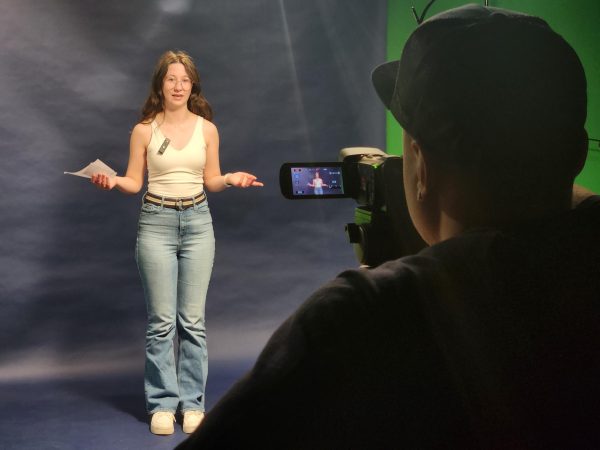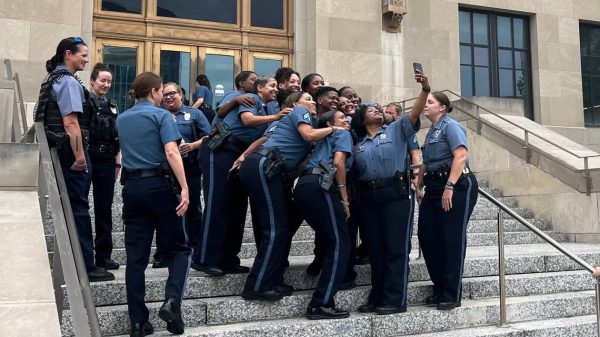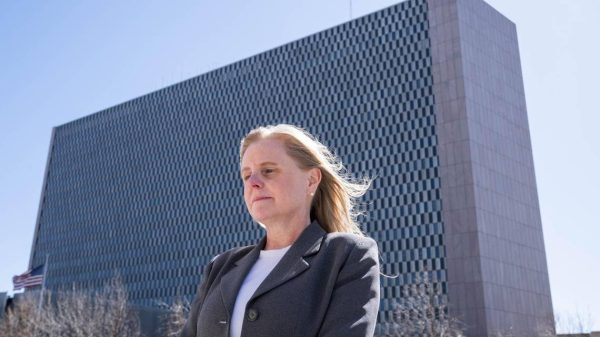Speakers discuss conditions in El Salvador
Between Guatemala, Honduras and Nicaragua sits the small ocean-side country of El Salvador. This country has a rich history of revolution, corruption and gangs.
On Jan. 14, Masters in Social Work Program Director and Professor Walter Kisthardt along with Park University alumni Joshua Klein and the Good Shepherd Sisterhood exchange program held a delegation panel to discuss the issues in El Salvador at the McCoy Meetin’ House on the Parkville campus.
“Back in 1992 we added a sisterhood (through Good Shepherd Parish) right after the peace accords after the El Salvador civil war,” Klein said.
“The people there helped us buy some land to make a community for people that were displaced from the war.”
Since then, the Good Shepherd Parish Sisterhood has sent delegates to and from El Salvador to help with restoration, education and to raise awareness to the political issues that are hampering El Salvadorans.
The three visitors from El Salvador shared their past and present experiences at the delegation last week. They brought with them experiences spanning the issues with the El Salvador Civil War, the large employers of the coffee fields as well as today’s issues to include societal injustices such as lack of education, women’s rights and gang violence.
The first speaker, Carmen Viuda de Argueta, has lived through the country’s revolution as well as the daily struggles of El Salvadoran women and children. She has been part of the fight against social injustices since the 1960s.
At the event, she said in 1969 the political party the Farabundo Martí National Liberation Front or FMLN followed the word of Archbishop Óscar Romero.
During the civil war, citizens fought the military-led government and suffered many losses on both sides. Romero was assassinated in 1980 and it was after his assassination the peaceful protests turned violent. This is contributed to what may have sparked the Salvadoran Civil War, which was fought for 12 years covering 1980-1992, according to pbs.org.
Even though the civil war was long and devastating, there were some positive outcomes such as social and worker organizations to include rural workers.
Rural workers were exposed to extreme low wages but by aligning themselves with workers organizations they were able to address the issue of wages and working conditions. Viuda de Argueta is currently working on projects that help teach women basic skills and works with an organization that gives women and family’s chickens, cows and seeds to help them become independent providers for their family.
Balthazar Mendoza, the second speaker, is passionate about the education system in El Salvador and is working on his degree in primary and secondary education.
“The education system was started in 1832,” he said “Throughout that time there was a variety of educational forms”.
Mendoza continues believe that when the armed conflict started, it nullified all the work the education system achieved by displacing those who were attending school but also by physically destroying the school houses.
It wasn’t until the peace accords were signed that the country could start to rebuild their own education system. In 1992, the El Salvador
Constitution was rewritten and included education laws.
“The General Education Law helps to set the basic structure of what public school systems and El Salvador would be,” Mendoza said.
He also discussed other education laws enacted after the accords including the Law of Careers to help create jobs and educate those that wanted those jobs.
These laws were created to ensure education in all age brackets but they still struggle with delinquency and criminal activities. Some of these struggles include basics such as school supplies and to make sure there is enough food and water to properly tend to children while in school.
Mendoza continues to reach his own educational goals while trying to enlighten others as to the struggles of his country. The El Salvadorian infrastructure is still weak but that there is a light at the end of the tunnel, he stated.
Glenda Miranda, who is 16 years old, also shared her experiences as a younger citizen. She said she and her friends struggle daily to get an education and not to fall victims to gang members and violence.
Miranda discussed how many of the families are from broken homes and suffer from not having family support which leads them to joining gangs and not receive an education.
“Sometimes we don’t feel safe in our own communities, when we go out or when we leave our houses and do things with our friends,” said Miranda, “because we are scared when we walk down the street because a gang member might pull out a gun and ask us for our shoes or our backpack.”
Because of fear, Miranda said, people do not continue to go to larger cities for their studies. She said her friend has been threatened multiple times for not giving the gangs money.
“It is this reason that many El Salvadorans immigrate to the United States,” Miranda said.
The other reason for immigration to the U.S. is even college graduates in El Salvador cannot get jobs. Most jobs require three to five years of experience after college graduation.
Gender inequality is a large issue for women and girls of all ages also according to Miranda, who is involved in a charity to assist women and children to learn basic skills in order provide for themselves and activities for kids at risk to join gangs.
Viuda de Argueta brought Park University three gifts to be placed on campus. The first is a flag of their political party. The red color represents the 80,000 people killed in the revolution, the white is about peace and the star stands for light and illuminated minds.
The other two gifts are a handmade painting of the lake at the base of the mountain they live near and a political poster of their representing party.
These items will be up for viewing on the third floor of Hawley Hall. For more information on the Sisterhood program please contact Kisthardt at [email protected].
Your donation will support the student journalists of Park University. Your contribution will allow us to cover our annual website hosting costs, freeing up other funds for equipment, printing and training.







